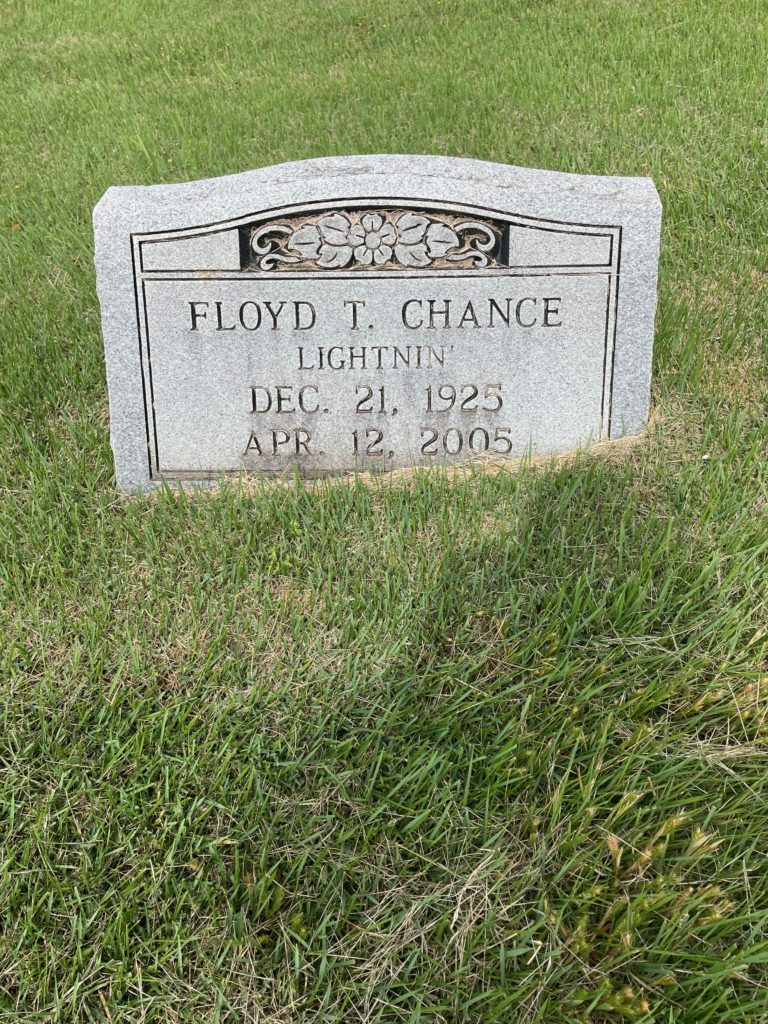Erik Visits an American Grave, Part 1,131
This is the grave of Floyd Chance.

Born in 1925 in Como, Mississippi, Chance got into music as a kid and learned to play several instruments, including the clarinet and tuba, as well as the guitar and sax. He could play just about anything. He was also a good high school football player and picked up the nickname “Lightnin” for his speed. During World War II, Chance was in the Navy and engaged in his musical expertise while in the Fourth Fleet Band.
By the time, Chance returned to the U.S. after the end of the war, he really was quite a good musician. He decided to make a go of it as a session musician. He moved to Memphis, one of the centers of American popular music. He got a job with a guy named Smilin’ Eddy Hill, a local entertainer who did a lot of radio work and advertisements, as musicians did during this era. He got to know Sam Phillips and began recording at Sun. By this time, he was mostly playing bass, and he quickly rose as the bass player of choice in the area. Nashville came a’callin. He got a job as a session guy there and was the bassist on Grand Ole Opry road tours, which was a good paying gig.
In 1952, Hank Williams entered the studio with a new batch of songs. Hank wasn’t doing real good these days, but his songs were still amazing. Hank didn’t really have a steady band at this point so the studio hired guys for the sessions. That included Chance. This was Hank’s last recording session before he drank himself to death on the road. Among the songs from those great sessions include “Your Cheatin’ Heart,” “Kaw-Liga,” and “Take These Chains from My Heart.” So Chance’s place in country music history was already set if he never recorded another thing.
But Chance recorded plenty. He was known as Lightnin’ during his musical career too because he was so good on the bass. He became part of the Nashville A Team. These were the studio musicians, largely picked out by the legendary producer and executive Owen Bradley, to play on the increasingly pop sophisticated country music albums of the 1950s. This was about 25 or 30 musicians who basically controlled the studios. There were seven or eight bassist as part of this group. Bob Moore was the real #1 bass player of this group, but Chance got plenty of opportunities too. Among the many great recordings he played on include the Conway Twitty’s “It’s Only Make Believe,” Faron Young’s recording of the early Willie Nelson song “Hello Walls” (the studio guys thought this song was really stupid; Young told them to shut up because it sounded like money to him and he was right), The Everly Brothers’ classics “Bye Bye Love” and “Bird Dog.” He became the bassist of choice for The Louvin Brothers, the Osborne Brothers, and Jimmy Martin, demonstrating his adeptness at playing bluegrass as well as anything else he could. He also was a frequent session guy on the Opry, which provided very steady work.
Chance also was something of an innovator. A lot of these musicians weren’t really trained musicians. Chance was, but he knew a lot of them weren’t. In a Nashville where professionalism was increasingly important, this became an increasing problem for a lot of very talented but not necessarily educated people. So Chance helped come up with something called the Nashville Number System, along with Neal Matthews and Charlie McCoy, which made it easier to follow chord changes by hand motions rather than reading music.
If you look at Chance’s Discogs page, which is not even close to complete but is probably the most complete set of information we have for someone like this without going into the archives, it’s pretty amazing. He played on EVERYTHING. There he is on Tom T. Hall’s great album New Train Same Rider. There he is playing with Jim Reeves on his Live at the Opry record. He’s with Johnny Cash on “Rockabilly Blues.” He’s working with Willie Nelson on his early recordings. That’s his bass on Marty Robbins‘ classic Gunfighter Ballads and Trail Songs, i.e., “Big Iron” and “El Paso.” He also co-wrote “Alligator Man” with Jimmy C. Newman, which was a huge hit recorded by dozens of artists, from Dave Dudley to Alex Chilton to Bob Dylan.
Chance left the music industry in 1988 but had over four decades of recordings to be proud of. He moved back to his home town in north Mississippi and lived there the rest of his life. Eventually, he contracted Alzheimer’s Disease. He died in 2005, at the age of 79.
Floyd Chance is buried in Love Cemetery, Hernando, Mississippi.
If you would like this series to visit other members of the Nashville A Team, you can donate to cover the required expenses here. The pianist Bill Pursell is in Nashville. So is the guitarist Fred Carter. Heck most of the guys probably are and I need to get back to Nashville anyway. So take care of this. Previous posts in this series are archived here.


